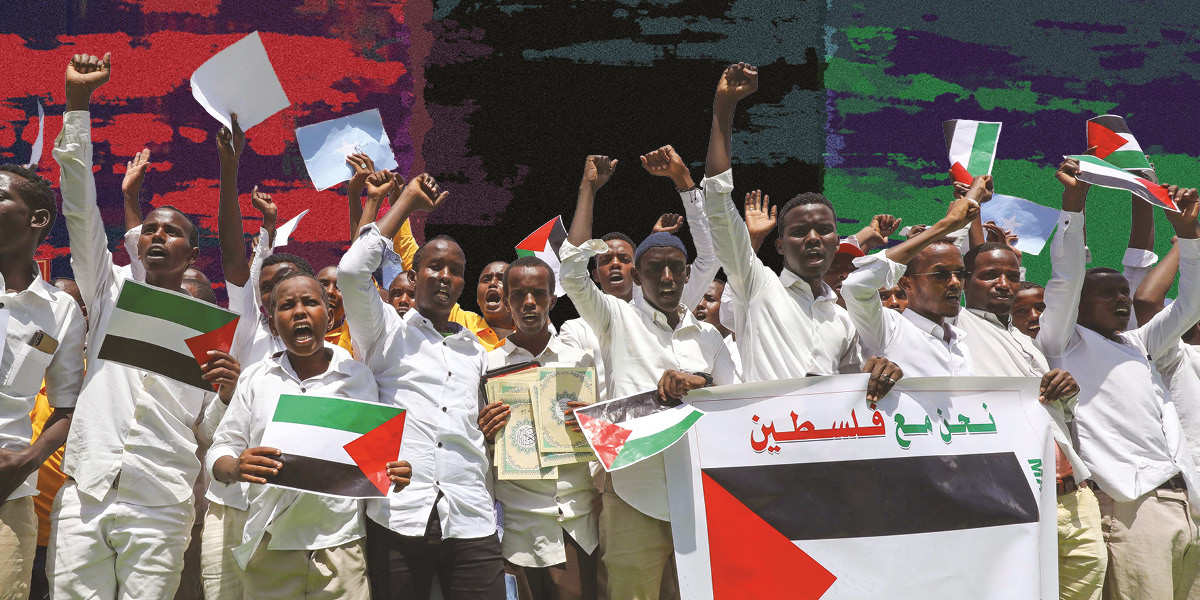The Palestinian struggle has long captured the imagination of oppressed South Africans. Israel held close ties with the apartheid state of South Africa, with relations dating back to the creation of the Israeli state in 1948 after the expulsion of Palestinians from their land. The same year, the National Party came to power in South Africa in a whites-only election and began to create the legal system of discrimination and repression they called apartheid.
In response, strong bonds were forged between resistance movements, including the Palestine Liberation Organisation (PLO) and the African National Congress (ANC) and Pan African Congress (PAC) in South Africa, as well as the South West People’s Organisation (SWAPO) in Namibia and the Mozambique Liberation Front (FRELIMO).
Ronnie Kasrils, chair of the Palestine Solidarity Campaign’s Johannesburg branch, recalls: ‘We South Africans fighting apartheid, and turning to armed struggle in 1961, had a special affection for the Palestinian people. We taught about the Palestinian struggle in our training camps; we read Palestinian poems and books; we had their posters on our walls. When we trained in Algeria, Egypt, the Soviet Union, our paths crossed, and we were elated to share similar stories.’ In the era of decolonisation, Palestine was a critical rallying cry against imperialism.
In the late 1960s and early ’70s the Black Consciousness Movement, a grassroots anti-apartheid movement, also expressed support for the Palestinian struggle. So too did one of Africa’s greatest independence heroes, Amílcar Cabral, who said: ‘We stand with the Palestinian refugees and support everything that the children of Palestine do in order to free their country, and… the Arab and African countries do to aid the Palestinian people to recover its dignity, its independence and its right to life.’
South Africans recognise Israel’s culpability in their own historic oppression. In the 1970s, this extended to the field of nuclear weaponry – Israeli experts helped South Africa develop at least six nuclear warheads. In 1977, after the murder of anti-apartheid activist Steve Biko by South African security police, the UN imposed a mandatory arms embargo on the country. And by the 1980s the global anti-apartheid movement forced states to impose sanctions.
Nelson Mandela famously said, ‘We know too well that our freedom is incomplete without the freedom of the Palestinians’
But as late as 1980, 35 per cent of Israel’s arms exports were destined for South Africa and, in the same decade, Israel imported South African goods and re-exported them to the world as a form of inter-racist solidarity. Meanwhile Israeli companies subsidised by the apartheid regime were established in a number of bantustans, all the while paying workers a pittance.
It has now been over two decades since the 2001 Durban World Conference against Racism described Israeli oppression as apartheid. Today, the fact that Israel practises apartheid is recognised by the United Nations, Human Rights Watch, Amnesty International, B’Tselem (based in Israel), Al Haq (based in Palestine) and numerous other rights organisations.
Shifting ties
The historic ties forged through common struggles for national liberation in Africa and Palestine have shifted, however, in the past 20 years. Many African states are normalising relations with Israel. Until the recent outbreak of violence, Sudan was close to normalising relations with Israel through a UAE-brokered deal.
In 2022, Morocco signed a normalisation agreement. In July 2023, Malawi announced the opening of an embassy in Israel. And bilateral economic relations are expanding in Ghana, Kenya, Tanzania and Senegal.
Embracing Israel violates the radical commitment enshrined in the preamble to the African Charter on Human and Peoples’ Rights ‘to eliminate colonialism, neocolonialism, apartheid, Zionism’. South Africa, alongside Namibia, Algeria and Nigeria, was at the forefront of challenging the unilateral decision in 2021 by African Union chair Moussa Faki Mahamat to grant Israel observer status to the AU in 2022.
Embracing Israel violates the radical commitment enshrined in the preamble to the African Charter on Human and Peoples’ Rights, ‘to eliminate colonialism, neocolonialism, apartheid, Zionism’
The following year, an Israeli foreign ministry representative was expelled from the AU opening session due to ongoing pressure for Israel to remain outside the AU until a consensual decision on the matter is taken. These events are indicative of Israel’s complex political manoeuvrings with a number of African governments.
Israel, a powerhouse in the global military-industrial complex, is also increasing military cooperation with some African states. Senegal, a country fighting a war against armed groups on its southern border, spent over half a million dollars on Israeli arms and ammunition in 2020.
Israel also sells surveillance and security technologies to various African governments. This has included Pegasus software, which was found on cell phones in a number of African countries, and has been central in undermining democracy in Africa and elsewhere.
In an attempt to greenwash its apartheid crimes, Israel is also selling water and agri-technology to African countries. Never mind that these projects are often unsustainable and destructive to local communities, nor the bitter irony of Israel selling water technologies when Palestinians in the occupied territories are cut off from water supplies on a routine basis.
Solidarity today
As a result of these various developments, in March 2022 solidarity organisations and activists launched a Pan-African Palestine Solidarity Network (PAPSN) in Dakar, Senegal. Participants came from 21 countries. PAPSN aims to build a continent-wide solidarity network to lobby African governments and mobilise civil society, and through the Boycott, Divestment and Sanctions (BDS) campaign, ensure an end of all relations by African governments, institutions and civil society organisations with the Israeli apartheid regime.
The former South African president Nelson Mandela famously said, ‘We know too well that our freedom is incomplete without the freedom of the Palestinians.’ In 2022, addressing the PAPSN launch meeting, his grandson, Nkosi Zwelivelile Mandla Mandela, reminded us that: ‘We must continue to mobilise the Boycott, Divestment and Sanctions (BDS) campaign as a critical pillar of our solidarity work in Africa.’ It’s in the spirit of internationalism that the fight continues.










